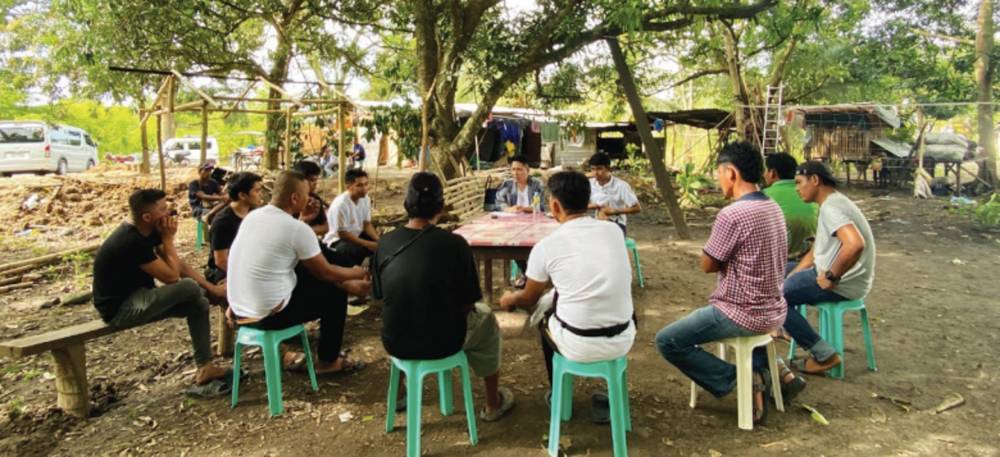Conflict trauma’s lasting scars: Bangsamoro folk cited in study

MOVING ON AFTER THE FIGHTING In this photo taken in May 2023, members of the Sasakawa Peace Foundation hold a focus group discussion on gender dynamics in the Maguindanao villages of Talisawa and Datu Abdullah Sangki, communities that have survived the long-drawn conflict in Mindanao. —Charry Camacho Legaspi/contributor
BARMM, Philippines — For almost two years, Delia Hoe was a walking cauldron of fear, rage and hatred.
It was a mix of emotions directed at people she didn’t even personally know: the perpetrators behind the bombing of the Our Lady of Mount Carmel Cathedral in Jolo, Sulu, in 2019.
“I kept hiding myself, not going to church, sad and full of self-pity as a victim of the bombing,” she recalled.
Through the Office of the Presidential Adviser on Peace, Reconciliation and Unity, Hoe was made to undergo psychosocial healing sessions designed to help her come to terms with what happened—and move on.
READ: Conflict’s long game
However, this is not the case for many people like her in the Bangsamoro region.
While the public need for mental health and psychosocial support (MHPSS) is strong, access to these services remains limited, according to the study by Tokyo-based think tank Sasakawa Peace Foundation (SPF) and Indonesia-based research group Integral Knowledge Asia.
The study focused on the Bangsamoro Autonomous Region in Muslim Mindanao (BARMM), as well as two areas with a similar history in Indonesia.
“To date, the Bangsamoro government’s militarized focus on security and stabilization has sidelined MPHSS services,” said the study released on May 22.
READ: Lorenzana: Spiritual, moral recovery key in Marawi City restoration
‘Invisible outcome’
Besides the BARMM, the Indonesian provinces of Aceh and Maluku were also examined primarily in terms of how masculine norms shape violence and unequal gender relations among families and in postconflict communities.
Out of more than 6,000 people who took part in the study, 2,037 were from the BARMM provinces of Lanao del Sur, Maguindanao del Norte and Maguindanao del Sur.
The most common type of mental health problem confronting the participants is fear for their family’s safety, with three out of every 10 men and four out of every 10 women in the two Maguindanao provinces citing this concern.
Other issues that surfaced stemmed from fear for one’s own safety, distrust of other people, and wanting to be alone.
The study framed conflict-related trauma as an “invisible outcome of war that will require healing to achieve normality.” Research consultant and Inquirer columnist Rufa Cagoco-Guiam, who has been doing research on victims of armed conflicts since the martial law era, said many people in the Bangsamoro region need intervention at a level requiring trained professionals.
“But we don’t have those professionals. Even the [BARMM] Minister of Health decries the fact that there are more medical doctors and nurses but not psychiatrists,” she said.
‘Religious processes’
According to Cagoco-Guiam, some martial law survivors still tend to shed tears when recounting their experience, a sign that the “trauma has not been addressed in the past.”
“They just bury them deep into the subconscious so it becomes a trigger … It was another trigger for resurfacing the old trauma from before. That’s how desperately people need trauma healing,” she said.
With not enough mental health professionals around, Guiam noted, it’s the religious leaders in the Bangsamoro region who had filled the gap by providing counseling.
The study also pointed out that, as an alternative to psychiatrist-led MHPSS programs, “people use multiple resilience strategies for coping with trauma.”
“While barriers remain to accessing widespread MHPSS services, respondents in Aceh and the Bangsamoro described using Islamic or religious healing processes, such as seeking solace through prayer, chanting and meditation, consulting religious leaders and teachers, using medicinal herbs, dietary practices [like fasting], and applied therapy [such as massage],” it said.
Verbal abuse
Researcher Maho Nakayama said that, among the study participants in the two Maguindanao provinces and in Lanao del Sur province, it was mostly women—not men—who admitted being prone to committing verbal abuse at home.
In the two Maguindanao provinces, 26.8 percent of men, compared with 17.2 percent of women, said they were verbally attacked by their spouse. In Lanao del Sur, 29 percent of men and only 6.5 percent of women reported experiencing verbal abuse.
“Interestingly, [a] significant number of women in Lanao del Sur also reported carrying out physical assaults at home,” Nakayama said.
The study emphasized that “postconflict economic marginalization, inadequate restorative justice and ongoing insecurity further destabilize society,” resulting in high levels of mental illness.
The researchers noted how the the BARMM government had taken initial steps to address the problem of trauma, with its Ministry of Health establishing the Bangsamoro Council for Mental Health in June 2023.
The regional government is also working with international organizations to provide MHPSS services, including an “Islamic approach to mental well-being.”
Gender-responsive approach
The risk of conflict relapse is high in the BARMM, the study said. And while a militarized approach is deemed necessary by many respondents, “there is also [the realization] that many broader peace priorities, such as good governance, economic welfare and poverty reduction are not being achieved, risking future violence.”
The researchers recommended shifting the “militarized strategy” that is centered on security, infrastructure and economic development, to a gender-responsive approach.
This includes rebuilding social welfare infrastructure, protection for high-risk groups, fair distribution of job opportunities and wider access to MHPSS.